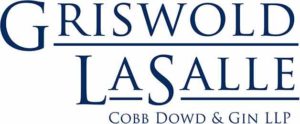How an Attorney Can Help with a Small Claims Case
Small claims court, as the name suggests, is a way to resolve claims under $10,000. Because of this limit, attorneys cannot represent people in court on these cases. Although an attorney cannot appear for you in court, the attorneys at Griswold LaSalle can assist you in the background of your small claims matter.
First, like any lawsuit, a document called a complaint must be written, filed in court and sent to the other person in the case. There are many different legal theories that a person can sue or be sued on, such as property damage, collection of money owed to you, or minor personal injury claims. The attorneys at Griswold LaSalle can assist you with the writing of the complaint so that the judge can quickly and easily figure out your claim, its filing with the court and providing it to the other party.
Second, when you sue someone or are sued in small claims, you will be required to physically appear in court and either prove your case or defend yourself at a trial. Usually, these cases are very short and have a limited number of witnesses and documents to present to the court. Again, while an attorney cannot stand up in court and speak for you in small claims, we can prepare you for your day in court. This includes organizing any documents or photographs that prove your side of the case, using the legal power of the court to require witnesses to attend the trial and preparing questions for those witnesses. Such preparation can make or break your case when it comes time to present it to the judge.
Third, after your case is heard, if you do not win, we are permitted to represent you on an appeal of the judge’s decision. In small claims court, the appeals process throws out the previous judgment and allows a new trial to take place. At this stage, attorneys at Griswold LaSalle can represent you in court and attempt to obtain a more favorable outcome.
If you prevail in small claims court, we can assist with enforcing the judgment signed by the judge. The judgment is the legal document that is used to create a valid lien on real property, wage garnishment or a levy on a bank account of the person who owes you money. These three methods are the most common recovery.
We can assist with the behind the scenes work in a quick, efficient manner for you so that you are prepared for your day in court and can take over for you to collect what is owed.

